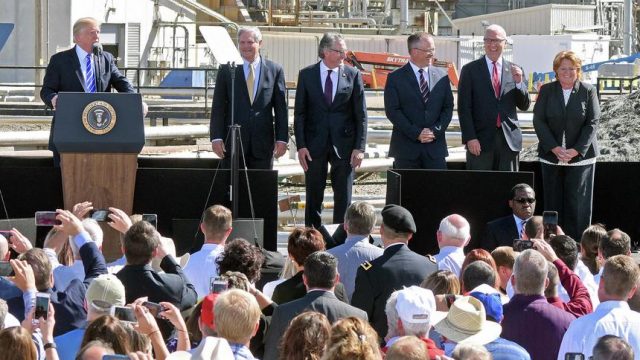Governor Doug Burgum: Make America Competitive Again Through Tax Reform

TOM STROMME/Tribune Joining President Donald Trump, left, on stage at the Adeavor Mandan Refinery were from left Sen. John Hoeven, Governor Doug Burgum, Lt. Gov. Brent Sanford, Rep. Kevin Cramer and Sen. Heidi Heitkamp. President Trump invited the officials to the stage during his welcoming remarks on Wednesday afternoon.
Actions taken by President Trump and his administration during his nearly eight months in office have been a wind at our back for North Dakota’s economy.
Whether rolling back overreaching regulations that threatened our coal industry and our farmers’ livelihoods, providing relief for drought-stricken ranchers, or approving pipeline infrastructure that adds value to the North Dakota oil industry, this pro-energy, pro-agriculture, pro-business administration has benefited residents statewide.
Yet this strong start pales in comparison to the enormous potential for tax reform to stimulate the economy in North Dakota and across the nation.
Like many Americans, we’re eager to learn more details of President Trump’s tax reform plan as it’s refined by his administration and Congress. But already we recognize some of the basic principles as sound, because they’ve been working in North Dakota for 25 years.
[mks_pullquote align=”right” width=”300″ size=”24″ bg_color=”#ffffff” txt_color=”#000000″]Americans deserve a cooperative, bipartisan effort from Congress to help our nation regain its competitive edge, grow the economy, create jobs and return wealth from Washington back to the people who make our nation prosper.[/mks_pullquote]
Reductions in individual and corporate income taxes, common-sense regulations and a business-friendly environment began under Gov. Ed Schafer, expanded under Govs. Hoeven and Dalrymple and continue today. The result: a robust North Dakota economy that has largely been able to weather a severe downturn in crude oil and farm commodity prices. Just last month, the website www.fitsmallbusiness.com named North Dakota the best state to survive a recession, citing the state’s low unemployment rate, GDP growth and low ratio of state debt to income.
This resiliency did not happen by accident or good fortune. As President Trump astutely pointed out in his speech Wednesday at the Andeavor refinery in Mandan, “North Dakota chose to embrace American industry and the American worker even when many in Washington wanted to tax and regulate your industries totally out of existence.”
That’s not to say our state is without its challenges. Drought and volatile commodity prices remind us how susceptible we are to forces beyond our control and accentuate the need to diversify our economy.
Diversification, innovation and investment will lift our nation and our economy only if we can be liberated from the burdensome, cumbersome, outdated tax code that puts U.S. businesses at a disadvantage in the global marketplace.
The president’s proposal to reform the tax code, including corporate income taxes, is long overdue. Because, in the end, every tax comes out of the wallet of a human being. The corporate income tax may sound like it’s paid by the company, but ultimately the tax is a cost of doing business that is paid by the consumers of that company’s products, the shareholders of the company, or their workers in the form of lower wages or fewer jobs.
With one of the world’s highest corporate tax rates, we have been systematically punishing our very best U.S. companies to the point they move their operations overseas, where they keep and reinvest those profits. This kills investment and job creation in the United States. Allowing trillions in profits to return to our country would be a historic stimulus to U.S. investment and innovation and help accelerate the return of our national GDP growth to higher levels.
Core components of the president’s plan are worthy of serious debate and consideration: cutting taxes for low- and middle-class families, shrinking the current seven tax brackets to three, doubling the standard deduction, repealing the Alternative Minimum Tax and debilitating death tax and closing tax breaks and loopholes for special interests.
Americans deserve a cooperative, bipartisan effort from Congress to help our nation regain its competitive edge, grow the economy, create jobs and return wealth from Washington back to the people who make our nation prosper. And voters should hold to account those who obstruct comprehensive tax reform.
All North Dakotans can be proud that the President held up North Dakota’s pro-growth, pro-agriculture, pro-energy and pro-business approaches as an example for the nation to follow. Now, with federal tax reform, we have a historic opportunity to restore the United States’ competitiveness as the example for the world to follow.




